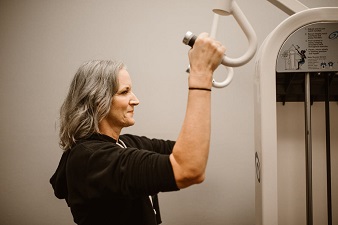Treatment of Endometriosis Varies from Person to Person
Although dysmenorrhea is a common symptom, it should not be tolerated repeatedly to avoid delaying the diagnosis or making the condition challenging to treat. In addition to primary dysmenorrhea, many diseases can cause dysmenorrhea, and endometriosis is most common.

Endometriosis is when the endometrial tissue, which is supposed to grow in the innermost layer of the uterus, grows abnormally outside the endometrial layer. Generally speaking, this kind of endometriosis grows in the wrong place, mainly in the pelvic tissues and organs. For example, they may be found in the ovaries, fallopian tubes, uterosacral ligament, rectovaginal septum, pelvic peritoneum, vagina, and within the myometrium of the cervix. It is often referred to as endometriosis.
The disease manifests differently depending on the location of the endometriosis. The most common symptoms are dysmenorrhea, infertility, and painful intercourse, three problems that penetrate a woman's daily life and even affect the quality of her marriage. About one-third of patients have varying degrees of dysmenorrhea, and the pain tends to increase year by year with the aggravation of the local lesion, the so-called rectal dysmenorrhea.
Some patients may experience localized pelvic pain due to compression of the bowel, bladder or nerves, or complain of unpleasant sexual intercourse. It is especially evident in patients with ectopic lesions in the recto-uterine recess or those with a posteriorly fixed uterus due to lesions.
In addition, infertility is present in about 75% of patients. The cause of infertility is not well understood to date. In severe cases, it may be related to extensive adhesions of organs and tissues in the pelvis and diminished peristalsis of the fallopian tubes. The expulsion, uptake, and fertilization of the egg are affected. While in mild cases, it may be due to disturbance of the standard ovulation mechanism due to various causes.
It seems that endometriosis is indeed one of the most complex diseases in gynecology. Obstetricians and gynecologists often find it tricky, so it is best to prevent it before it happens. What can be done to live with this benign but annoying chronic disease? Specifically, the following points can be considered.
1. Early detection and early treatment.
Studies have found that endometriosis has a significant genetic predisposition, and women whose mothers or sisters have endometriosis are about seven times more likely to develop the disease. Therefore, women whose mothers or sisters have severe menstrual cramps or are suspected of having endometriosis should take the initiative to get checked to facilitate early detection and seize the opportunity for treatment. If you have endometriosis, you should follow your doctor's instructions and have regular follow-ups or checkups.
For the treatment of endometriosis, medications such as the herbal medicine Fuyan Pill can be used. Women who have fertility requirements will not opt for surgery for hysterectomy. They can first be treated with Fuyan Pill. Fuyan Pill has anti-inflammatory and antiseptic functions and can cure endometriosis within a few months by adhering to the medication.
2. Drug contraception.
Long-term use of contraceptive pills can inhibit ovulation and promote endometrial atrophy. Reduced menstrual flow, thus reducing the chance of menstrual blood and endometrial debris flowing back into the abdominal cavity. However, women who are obese and smokers are not suitable to take the pill and should discuss it with their doctors to make a decision.
3. Avoid unnecessary surgical operations.
Induced abortion surgery increases the chance of reflux of endometrial debris into the pelvic cavity. In recent years, the increase in cesarean sections also increases the likelihood of planting endometrium in the myometrial wall, pelvic cavity, abdominal wall, and other areas. In addition, not strictly grasp the indications for the placement of intrauterine devices and postoperative complications are not handled promptly can increase the possibility of menstrual reflux, endometrial implantation.
4. Strengthen exercise, enhance immunity.
A woman's body must have a sound immune system to engulf and process stray menstrual blood and endometrial tissue effectively. A regular life, adequate rest, proper diet, and reasonable exercise can effectively improve the immune system. It is also essential to reduce stress and keep the body and mind happy, as depression can reduce immune function.
You may also be interested in:
How to Relieve Pain from Endometriosis? Know Some Useful Therapy!
previous pageEndometriosis - a Modern Disease that Endangers Female Health
next page
You may also be interested in
- Herbal Treatment for Adenomyosis with Large Uterine Enlargement and Heavy Bleeding
- Effective Chinese Herbal Remedies for Adenomyosis Pain: End Your Period Discomfort
- Endometriosis and Debilitating Bowel & Bladder Pain: Diagnosis, Treatments, and Hope for Relief
- Struggling with Endometriosis Symptoms? Proven Back Pain and Painful Sex Relief Options
- Severe Endometriosis Treatment: Chronic Pelvic Pain Relief and Infertility Solutions
Testimonials
- Adenomyosis with Ureaplasma Urealyticum Cured by Fuyan Pill
- Tubal blockage with hydrosalpinx can be cured by TCM shortly
- Fuyan Pill Helps A woman with Adenomyosis Get Pregnant
- A Woman with Hydrosalpinx Is Cured with Fuyan pill
- Pelvic Inflammatory Disease Testimonials
- Irregular Vaginal Bleeding and Endometrial Thickening Cured by Fuyan Pill
- Pruritus Vulvae and Frequent Urination: Mycoplasma Infection Cured after 2 Courses



